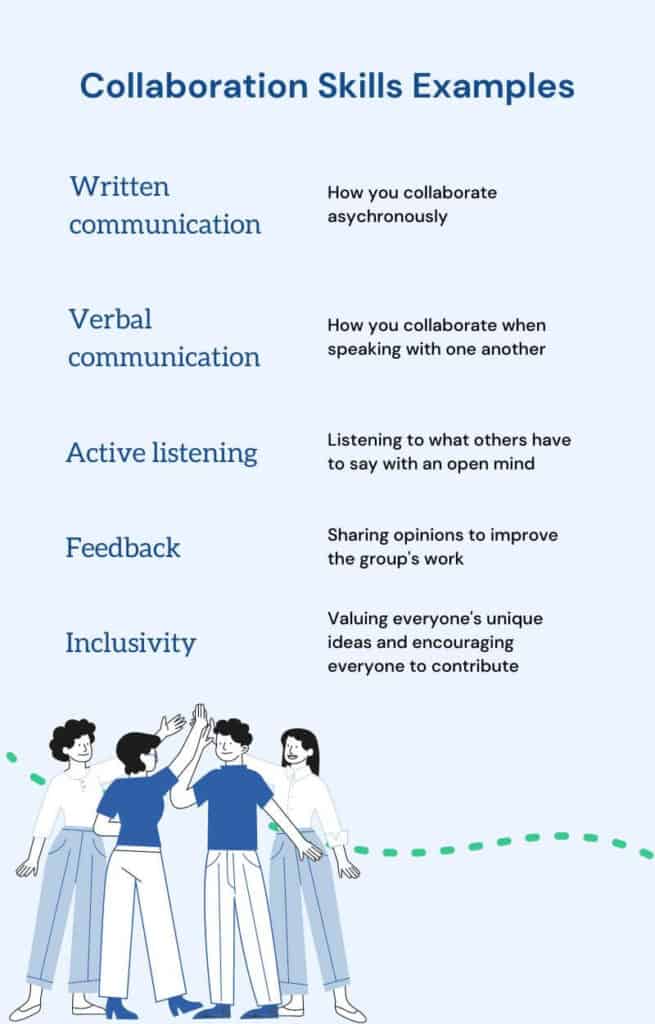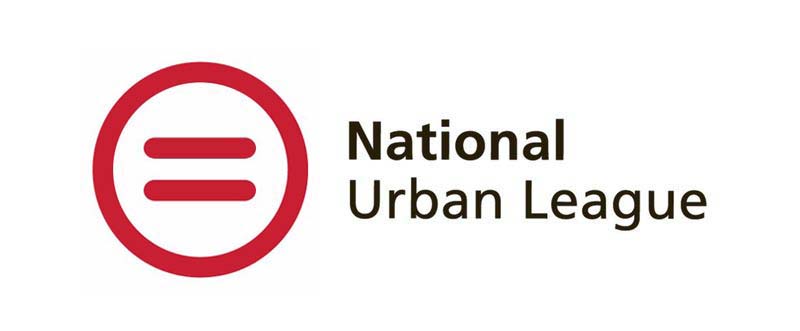Collaboration skills are what you use to work with others efficiently. In the workplace, collaborating means anything from brainstorming new ideas with a teammate to problem-solving with a client.
Collaboration skills are one of the top soft skills employers want from their employees. According to the National Association of Colleges and Employers, the ability to work in a team is one of the top skills employers look for on student resumes — and 76% of employers want candidates with these skills.
So, what exactly are collaboration skills, how do you improve yours, and how can you demonstrate them to employers?
>>MORE: Learn what careers are right for you based on your skills with a career aptitude test.
Collaboration Skills Definition
Collaborating happens when two or more people work together to achieve a common goal. Therefore, collaboration skills cover everything it takes to work well with others and deliver results as a team. A person who’s good at collaborating in the workplace is an influential team member, communicator, decision-maker, and leader.
Collaborating doesn’t just mean working with others to complete a project. To collaborate well, you need to build relationships with teammates, know how to resolve conflict when it arises, and create an inclusive, respectful working environment. Some examples of how collaboration skills look in the workplace include:
- Communicating updates to your manager to solicit feedback
- Recognizing other team members for their hard work
- Sharing insights and helpful tips with team members to improve group processes
- Intervening when there’s tension among team members and working to dissolve it
- Facilitating inclusive workplace practices to make all team members feel respected
Why Are Collaboration Skills Important?
Collaboration skills are one of the top skills employers are looking for in 2025, and for a good reason: they help us solve problems, learn from each other, and improve our work.
They Help Us Solve Problems
While a hiring manager assesses individuals for the strengths and skills they can bring to a team, they don’t expect a single person to come into an organization and solve problems alone. Instead, they want them to collaborate with others.
A good collaborator knows when to ask for help and who to ask for that help.
We Learn From Each Other
Each person in the workplace brings unique skills and perspectives. Collaboration encourages skill-sharing so everyone can learn from one another — whether as small as an Microsoft Excel hack or as big as a new type of workflow that can increase productivity.
They Make Our Work Better
Our work is better when we consider multiple perspectives and include ideas from other people.
When we collaborate, we look to others to weigh in and give feedback about what we’re working on.
As a result, we produce work that’s a product of different voices, backgrounds, and skill sets, which harnesses the power of multiple people instead of relying on a single person, mindset, and perspective.
Collaboration Skills Examples
Workplace collaboration takes many forms, depending on who you’re collaborating with and the medium in which you collaborate.
For example, collaborating with a peer on a quick email campaign will require different skills than collaborating with external clients on a month-long project.
Collaboration skills include written communication, verbal communication, active listening, feedback, and inclusivity skills.

Written Communication
In an ever-increasingly remote working world, written communication is crucial for collaborating with people you’re not physically working next to. Even if you connect over Zoom, providing written updates is always essential — especially when checking in with teammates asynchronously and providing a record of what you’re working on.
Someone with good written communication skills can summarize project learnings succinctly and clearly. They’re also effective at asking their teammates questions via messages or emails and providing enough detail to get the answers they need to move forward with a task.
Verbal Communication
A person who communicates well verbally can give their colleagues clear, straightforward updates in team meetings and show empathy in their tone when talking about problems or difficult work situations. Verbal communication skills reflect your demeanor in the workplace and can help you show up as a leader, even if you’re not a manager.
Active Listening
Collaboration isn’t just about communicating updates but also listening to what others have to say — and really hearing it. Active listening means listening attentively and with an open mind. This skill includes clarifying and asking the speaker open-ended questions. In addition, an active listener seeks to understand what the other person is saying without judgment.
Feedback
When collaborating with team members, you’re not going to get everything right on the first try. That’s where feedback comes in. A collaborative person can take feedback and implement changes based on what others think; they can also give others constructive feedback that helps improve what they’re working on.
Inclusivity
Team members need to feel respected and empowered to work well together. A good collaborator will create an inclusive environment when working with multiple people. An inclusive environment might mean creating guidelines for work processes so everyone feels safe and supported or asking for everyone’s perspective in a group discussion.
>>MORE: How Can You Tell if an Employer Values Diversity and Inclusion in the Workplace?
How to Improve Your Collaboration Skills
If collaboration skills are essential to succeeding in the workplace, how do you improve yours? I’ve improved my collaboration skills by working on my communication skills and building my trust in others.
Building Communication
Collaboration isn’t just about what others are doing, but also how you’re acting. While you can’t control others’ actions, you can control how you communicate with them. To become a better collaborator, I’ve worked to improve my:
- Written communication: I work remotely most of the time, so written communication is not only commonplace, but a crucial part of how my team learns what I’m up to, how we solve problems, and how we give feedback. I’ve gotten into the practice of taking a few seconds before responding to messages and reading my messages out loud to make sure they’re coming across in the way I want them to. I also work to over communicate and give more context (even if it feels like too much!) rather than less.
- Verbal communication: I focus on my tone and clarity when speaking, especially my confidence! As someone who recently joined the workforce, I find I can underestimate myself when imposter syndrome creeps in. Collaborating well means sharing my ideas confidently, but also knowing how to listen, which brings me to …
- Active listening: While I’m working on confidently sharing my ideas, I’ve practiced patience and try to fully absorb what my coworkers are saying instead of waiting to jump in with my opinions. It helps to write things down that I want to talk about so I can spend more time listening, and less time focusing on remembering what I want to say.
Building Trust
If you’re like me, group projects are the bane of your existence in school. Maybe you’d much rather work alone and try to get that “A” yourself — rather than just hoping your group members do their part of the work.
Unfortunately, group projects aren’t going anywhere once you leave school and enter the workplace. In fact, those projects will likely make up a large part of your work, especially if you’re in a highly collaborative role.
Here’s how I’ve built my collaboration skills and learned to develop trust in others:
- Go over expectations upfront: It may feel like an unnecessary step, but aligning before anyone starts work is key. Get everyone on the same page about what the project’s goals are, the ideas you have, and how much time you’re going to dedicate to it.
- Don’t make any assumptions: Good or bad, making assumptions about other people’s skills, bandwidth, or ideas can cause friction. Double and triple-check that everyone knows what they need to do and that they feel prepared and qualified to do their part.
- Give feedback: Feedback is an important part of the collaboration lifecycle! Unlike group projects at school, you’re likely working with your coworkers long past your project end date and will work with them often in the future. Giving (and asking for!) feedback can help everyone share what they think is and isn’t working, and improve and iterate for better collaboration and work in the future.
How to Include Collaboration Skills in a Job Application
On a Resume
You don’t want to write “collaboration skills” on a resume, but rather show who you collaborated with and how that collaboration helped you achieve results. You can do this within your resume job explanations.
“Putting ‘team player’ is one of the worst [words] someone can put [on their resume],” career coach Tazeen Raza says. “It’s better to add something like, ‘collaborated with tech team and product team to ensure goals were met quickly and efficiently.’ In this we are mentioning collaboration, efficiency, quickly, and goals.”
In an Interview
When answering common interview questions, show your collaboration skills by describing how you’ve used teamwork to deliver results. You can use the STAR method to help you clearly articulate the situation.
“The best way to show collaboration skills is to tell the story,” Mary Aceto, career consultant and CPRW, explains. “Provide a solid example of how your ability to partner with coworkers, vendors, or clients resulted in a positive outcome for the organization. Anyone can say, ‘I am a collaborative and passionate professional.’ If you can, say or write something like: ‘I was selected to contribute to a team charged with innovative ideas to launch our product in the New England market. Each team member brought a different perspective and our recommendations were presented and implemented within four months.’ That makes the word ‘collaboration’ come to life!”
Because collaboration is a soft skill versus a hard skill, it’s essential to paint a picture of how you embody this skill at work.
For example, don’t be afraid to get specific about the processes you used to implement and solicit feedback or describe how you built relationships with external clients. The more clearly you can explain your collaboration skills, the more the hiring manager can see how you’ll be a good culture add to their team.

Interview Success
Learn how to ace an interview by answering five commonly asked interview questions.
Avg. Time: 4-5 hours
Skills you’ll build: Communication, presentation, public speaking, poise, attention to detail, analytical thinking, problem-solving
Career Aptitude Test
What careers are right for you based on your skills? Take this quiz to find out. It’s completely free — you’ll just need to sign up to get your results!
Collaborating at Work: The Bottom Line
Every job requires collaboration to understand the company’s goals and how each person contributes to achieving those goals. So whether you’re effective at giving succinct, clear updates to team members or facilitating inclusive, constructive feedback sessions, show off your collaboration skills by telling the story of how you work with others — because employers want to hear it.
Image Credit: julief514 / Depositphotos.com


